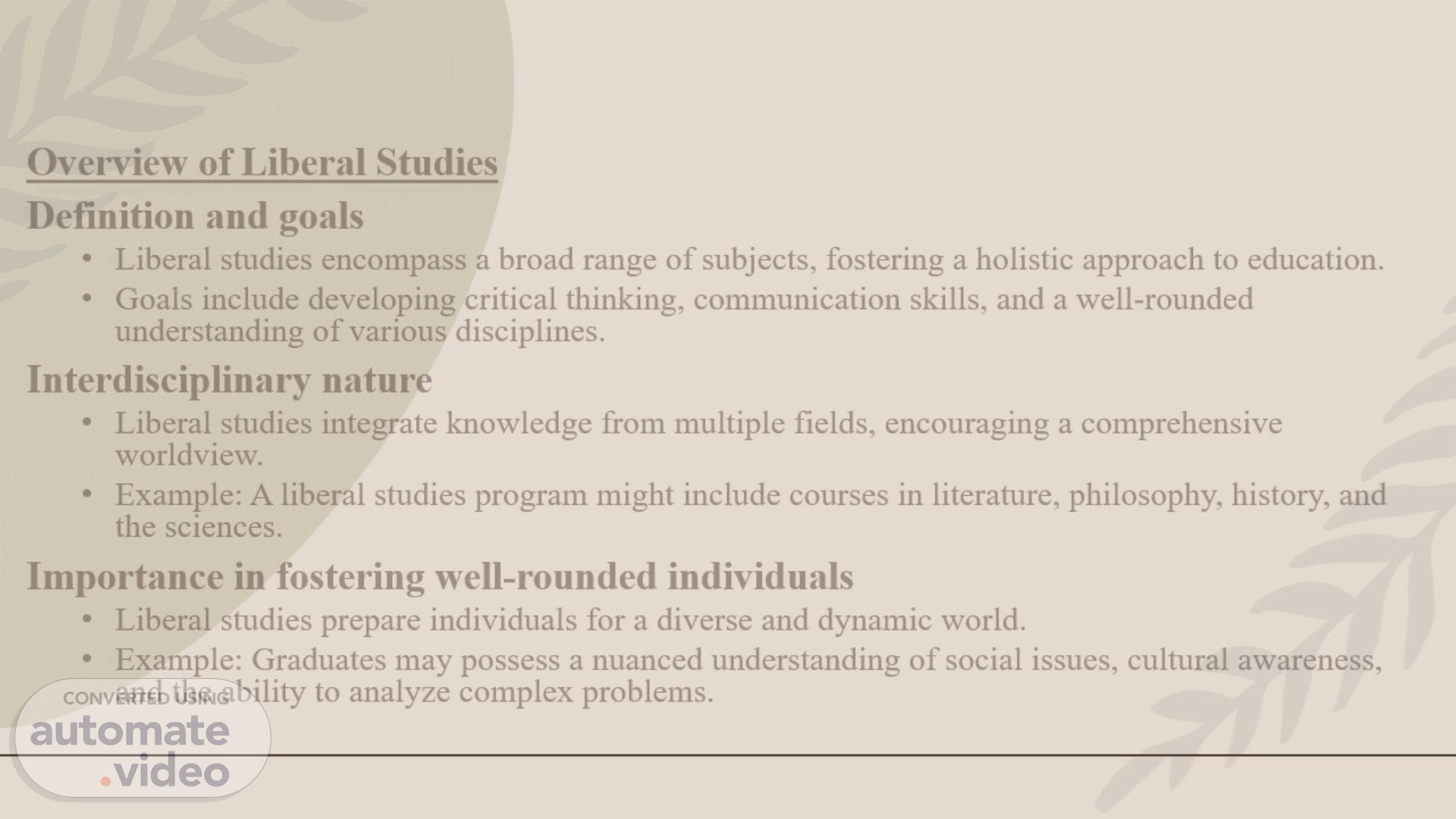
Criticisms and defense of liberal studies
Scene 1 (0s)
[Audio] Welcome to our presentation on 'Understanding Liberal Studies: Criticisms and Defense.' Liberal studies are characterized by interdisciplinary learning, the development of critical thinking skills, and exposure to diverse perspectives..
Scene 2 (28s)
[Audio] Liberal studies encompass a broad range of subjects, fostering a holistic approach to education. The interdisciplinary nature encourages a comprehensive worldview, preparing individuals for a diverse and dynamic world. Now, let's address some common criticisms. Critics argue that liberal studies lack specialization and may not be practical in a competitive job market. However, we'll explore how transferable skills and success stories counter these concerns. Some argue that liberal studies don't provide specialized skills for specific careers. But consider this: critical thinking, communication, and problem-solving skills acquired in liberal studies are versatile and applicable in various professional settings. Critics suggest that liberal studies programs have a bias towards certain ideologies. To address this, liberal studies actively expose students to diverse perspectives and encourage critical thinking and open discourse. There are concerns about the relevance of liberal studies in the digital age. However, liberal studies, with its emphasis on adaptability and the development of critical skills, equips students to navigate a rapidly changing, technology-driven world..
Scene 3 (1m 52s)
[Audio] Now, let's explore the strengths of liberal studies. We'll discuss how transferable skills, exposure to diverse perspectives, and a focus on critical thinking contribute to the enduring value of liberal studies. Liberal studies excel in developing transferable skills. These skills, such as critical thinking and adaptability, are not only applicable in various professions but also prepare individuals for lifelong learning and career changes. Liberal studies actively expose students to diverse viewpoints, fostering open-mindedness. Through critical thinking and open discourse, students are equipped to engage with various perspectives in a respectful and constructive manner. Liberal studies remain relevant in the digital age. By integrating technology-related topics and emphasizing ethical considerations, liberal studies contribute to shaping individuals who can navigate complex technological and ethical challenges. Liberal studies contribute to the development of global citizens and lifelong learners. Initiatives focusing on global perspectives and success stories of individuals attributing their achievements to liberal studies underscore its ongoing relevance..
Scene 4 (3m 20s)
[Audio] As we conclude, reflect on the journey we've taken. Liberal studies, with its emphasis on open-mindedness, adaptability, and continuous learning, prepares individuals for the challenges of the future. Education is evolving, and liberal studies play a crucial role in shaping individuals as lifelong learners. Ongoing advancements in pedagogy and the integration of technology contribute to the dynamic nature of liberal studies. In closing, liberal studies are instrumental in fostering informed, engaged, and adaptable citizens. Success stories of liberal studies graduates making meaningful contributions underscore the value of this educational approach. Thank you for joining us today. For further inquiries or discussions, please feel free to reach out. Let's continue to explore the impact of liberal studies on education and society. Thank you, and have a wonderful day..